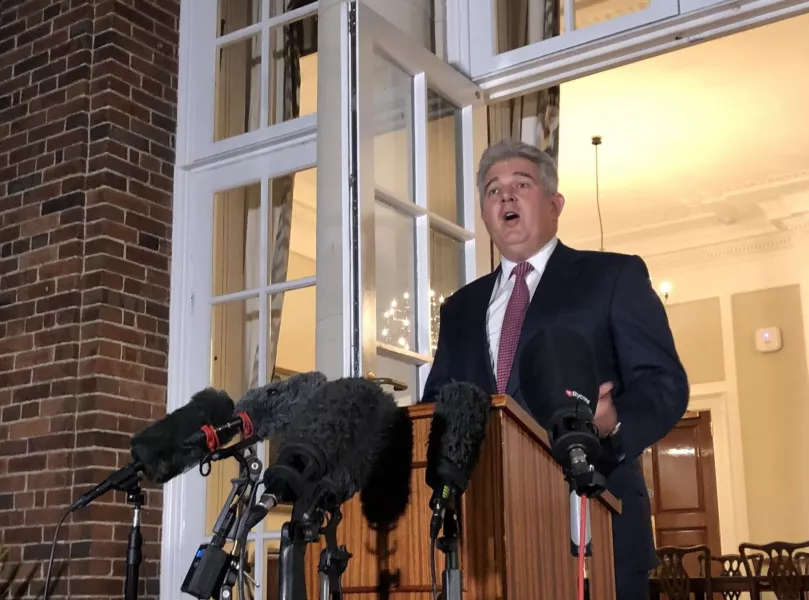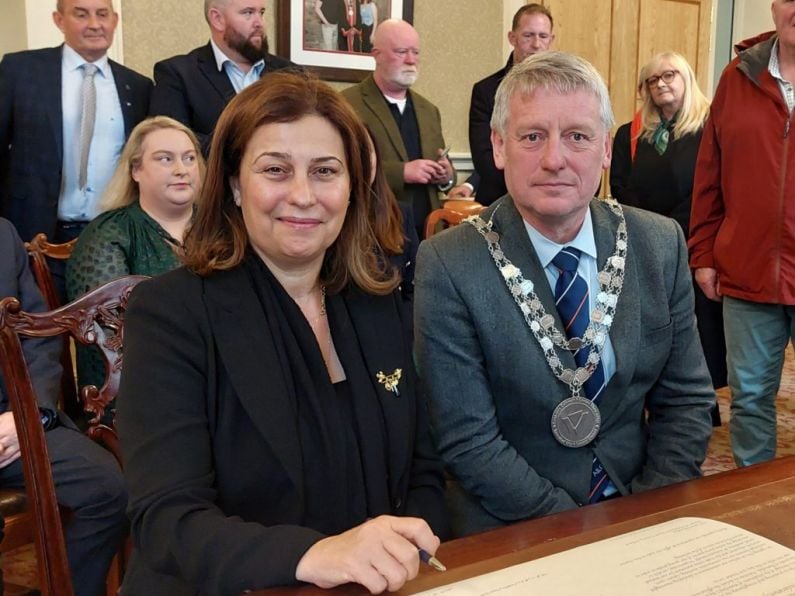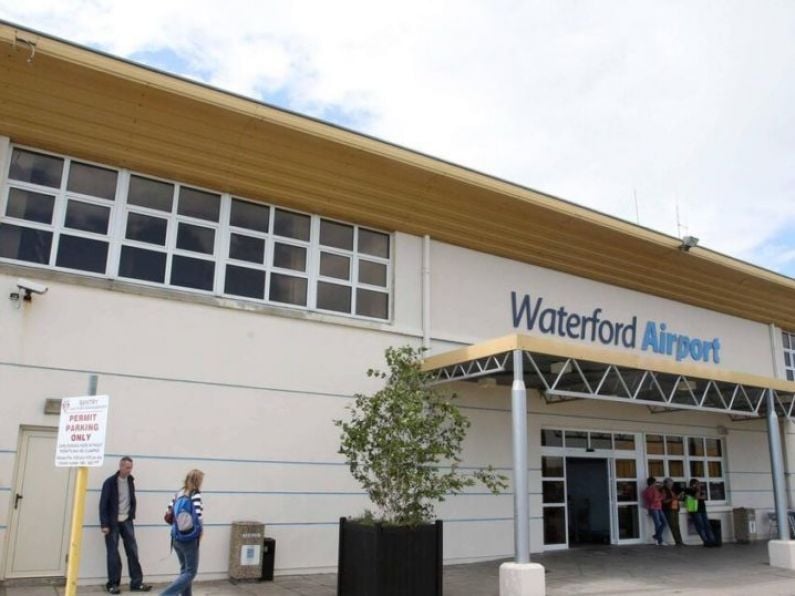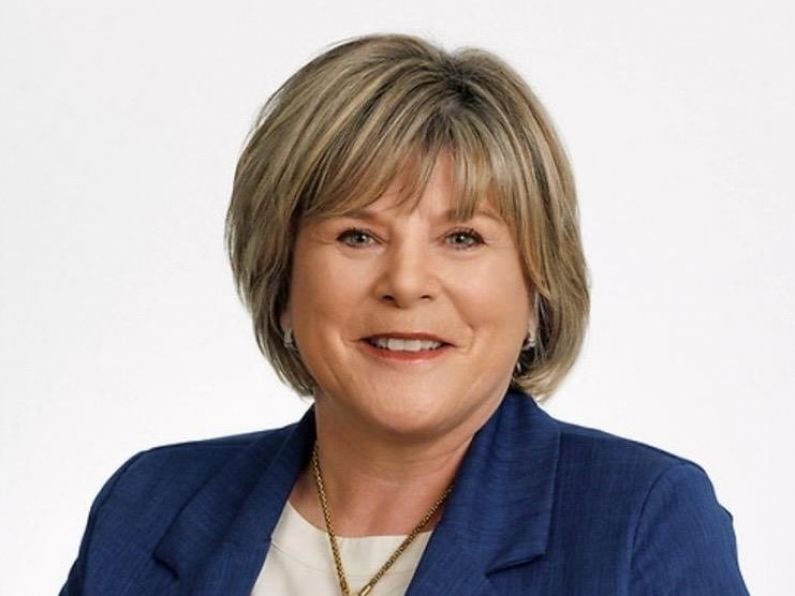By David Young, PA
A power-sharing crisis in Northern Ireland appears to have been averted after a late night deal over Irish language laws paved the way for Stormont leaders to be appointed.
A post-midnight announcement by the UK Government committing to pass the stalled laws at Westminster in the autumn, if they are not moved at the Stormont Assembly in the interim, was enough to convince Sinn Féin to drop its threat not to nominate a deputy First Minister as joint head of the devolved executive.
The development came after a night of intensive talks involving Northern Ireland Secretary Brandon Lewis and DUP and Sinn Féin delegations in Belfast.

Addressing the media outside Stormont House close to 1am, Mr Lewis said both parties had agreed to reconstitute the Executive by nominating to the positions of first and deputy first ministers later on Thursday.
If the nominations proceed on Thursday, the Executive will be able to hold a scheduled meeting later in the day to decide the latest pandemic relaxations for Northern Ireland.
Mr Lewis said it remained his preference for the language laws to be brought forward through the Assembly by the Executive, as originally envisaged in the 2020 New Decade New Approach (NDNA) deal that restored power-sharing.
“I am disappointed that it has not yet brought this legislation forward in the Assembly,” he said.
“However, following my intensive negotiations with the parties over the last few days, I can confirm that if the Executive has not progressed legislation by the end of September, the UK Government will take the legislation through Parliament in Westminster. If that becomes necessary, we will introduce legislation in October 2021.”
The British Govt has tonight agreed to legislate for Acht Gaeilge. This is the only way to break the cycle of DUP obstruction of rights. Sinn Féin will nominate @moneillsf as Deputy First Minister. We have important work ahead.
— Mary Lou McDonald (@MaryLouMcDonald) June 16, 2021
He added: “I now expect the DUP and Sinn Féin to nominate a first and deputy first minister in the Assembly at the earliest opportunity today.
“They have confirmed to me that they will do this, reflecting their enduring commitments to all aspects of the NDNA agreement.
“This will allow the Executive to return its focus to delivering on the issues that really matter to the people of Northern Ireland, issues such as health care, housing, education and jobs.”
A stand-off between the Executive’s two main parties over the thorny language issue had been threatening the future of the fragile institutions in Belfast.
The issue came to a head this week as a result of the process required to reconstitute the Executive following the resignation of ousted DUP leader Arlene Foster as First Minister.

The joint nature of the office Mrs Foster shared with deputy First Minister Michelle O’Neill meant that her departure automatically triggered the removal of Ms O’Neill from her position — as one cannot hold post without the other.
In order to form a functioning executive, and avert a snap Assembly election, both roles have to be filled by a deadline of this coming Monday at 1pm.
While the DUP has been poised to nominate Lagan Valley MLA Paul Givan as First Minister, Sinn Féin had made clear it would not renominate Ms O’Neill until it received assurances from the DUP that it would press ahead with the long-delayed Irish language laws.
The legislation, which includes the creation of Irish and Ulster Scots commissioners and the establishment of an Office for Identity and Cultural Expression, is an unfulfilled commitment within the 2020 NDNA deal.
While new DUP leader Edwin Poots, who succeeded Mrs Foster, had vowed to implement all outstanding aspects of NDNA, he has declined to give Sinn Féin a specific assurance that he will move on the language laws in the current Assembly mandate, a key demand of the republican party.
.@BrandonLewis says the UK government will pass Irish language legislation at Westminster in October if Stormont can’t do it in interim. Says both @duponline and @sinnfeinireland have agreed to nominate first and deputy first ministers on that basis. pic.twitter.com/wjbck9KnlN
— David Young (@DavidYoungPA) June 17, 2021
Amid the dispute, earlier this week Sinn Féin asked the UK Government to step in and move the legislation at Westminster instead. The DUP had warned Mr Lewis against such a step, characterising it as an overreach into devolution.
However, in the early hours of Thursday the Secretary of State announced that the Government would table the language legislation at Westminster in October if Stormont had failed to do so by the end of September.
Welcoming the move, Mrs McDonald said Mr Lewis’s intervention was the “only viable way” to break the deadlock. She confirmed the party would renominate Ms O’Neill later on Thursday.
“This matter of language rights has been a long running saga,” she told a post-1am press conference on the Stormont estate.
“For a very long time, the DUP has sought to frustrate these rights.
“That is most unfortunate, it’s also unacceptable. And tonight we have broken through that logjam of DUP obstructionism.
“This isn’t just significant for Irish speakers, this is significant for all of society, because of course power-sharing is based fundamentally on inclusion, on recognition and on respect.
“We are also happy to say on the back of the agreement struck now with the British government that we will nominate Michelle O’Neill to return to post as deputy First Minister, and we will work very hard, we will resume our work on the five party Executive.”
Mr Poots and Mr Givan left Stormont House earlier on Wednesday evening and did not make comment to the media as they exited.












